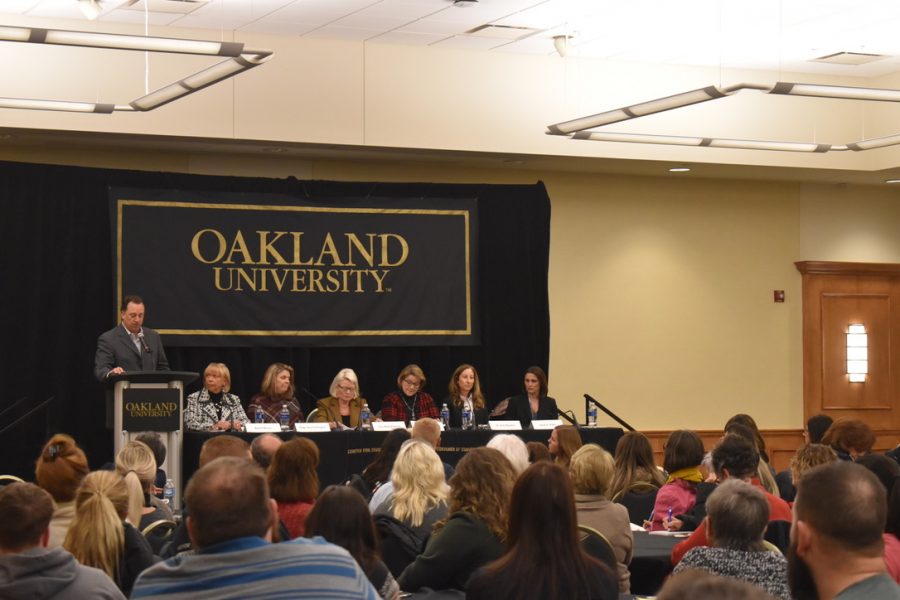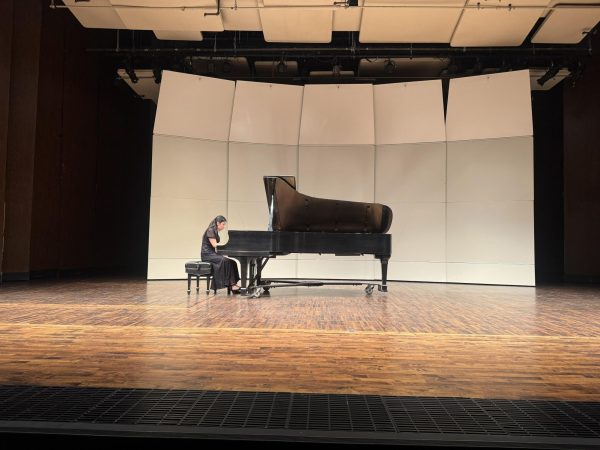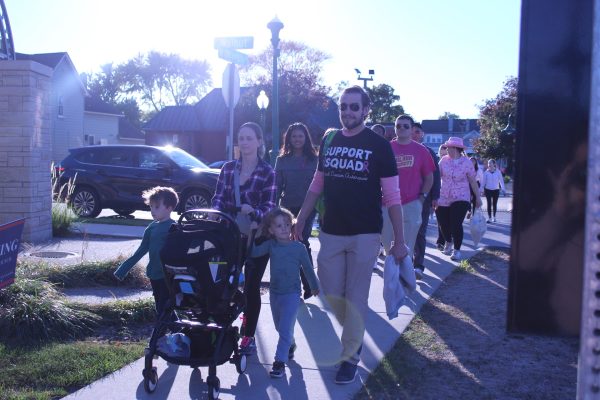Human trafficking panel informs OU community
David Dulio moderates the event with questions for the panel.
Human trafficking is not only happening across the globe, it’s not just happening in low income areas and it’s not just happening to women.
Oakland University’s Center for Civic Engagement partnered with Sanctum House on Monday, Jan. 27 in an event titled “Human Trafficking: Myth vs. Reality.” Sanctum House, a sanctuary for women survivors of human trafficking, brought panelists from multiple areas of expertise to answer questions about “one of the fastest growing illegal enterprises in the world,” according to Karen Moore, the executive director of the organization.
The panel included six women — Karen Moore; Paige Stocchi-Forgette, survivor of human trafficking; Michigan Senator Ruth Johnson, 14th district; Michigan Representative Christine Greig, 37th district; Dr. Jodi Flanders, CEO, Medical Missions and Imaging PC and medical director, Sanctum House; and Sarah E. Pettey, U.S. Department of Homeland Security special agent. These women answered questions prepared by David Dulio, director of the Center for Civic Engagement.
Prompted by Dulio and the audience, the women answered questions from many points of view the trafficking epidemic. The main focus of the evening was on Sanctum House. Moore spoke about how the trafficking industry is growing.
“It happens in every neighborhood, and it’s one of the fastest growing illegal enterprises in the world because it’s so profitable,” Moore said. “Drug dealers are getting out of selling drugs to selling people. If you have drugs — heroin, crack — you can only sell them once. If you have a cute girl or boy, you have a renewable commodity. So, it’s all about the profit motive, the greed.”
Moore also discussed how people may be susceptible to being pulled into this lifestyle. As trafficking is an all-inclusive industry, one common theme between most victims and survivors is vulnerability.
“If you don’t get your emotional needs met, if you’re vulnerable at a young age, if they aren’t being met at home, you’ll find a different way,” Moore said. “There are people out there, ready to fill those needs, knowing that once they get you into their world, then they have the power over you.”
Paige Stocchi-Forgette, a survivor of human trafficking and a resident of Sanctum House, shared her story to the audience of the panel.
“I came from a broken system,” Stocchi-Forgette said. “I was in several different foster homes. I was raped in most of them. Me and another girl ran away, and I know now that her family sold me and put me on a bus and sent me to New York. My first trafficker was waiting at the bus station. I was nine years old. I was with him until I was 12. Then, he sold me off to my second trafficker, and I was there until I was 16. I escaped and came back to Michigan.”
Stocchi-Forgette discussed how her life truly derailed once she began using drugs at 19 years old. She used them for 30 years until her first overdose served as her wake-up call.
Needing recovery, she set out to find help. She was untrusting, underfunctioning and lost. However, she was referred to Sanctum House two years ago, and she’s been working toward her goal of recovering ever since.
“People believed in me when I didn’t believe in myself,” Stocchi-Forgette said. “I was trusting people with my life to lead me in a direction that I’ve never even attempted to go before. I’ve been there for two years now, and I’m getting ready to graduate. These are my angels that changed my life, and I am so grateful for it.”
After Dulio asked his questions, the floor was open for the audience to ask theirs. The event continued on as parents shared their stories, panelists advocated for change and students inquired about educating their peers.
One man shared his story of his daughter’s survival of trafficking, and Stocchi-Forgette noticed the young woman in the audience and left the stage.
While the remaining panelists continued to speak, Stocchi-Forgette sat with the survivor and embraced her. She asked her, “Are you safe?,” and when receiving a quick nod, Stocchi-Forgette headed back to her seat with a heavy heart.
“We don’t save anybody, we give them the tools to save themselves,” Moore said about Sanctum House.
The National Human Trafficking Hotline is 1 (888) 373-7888.





